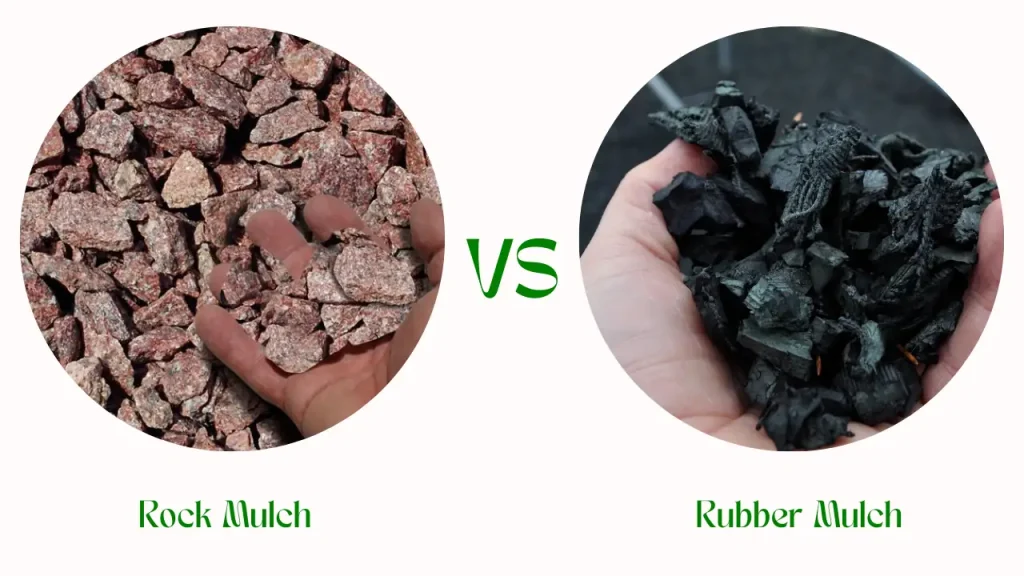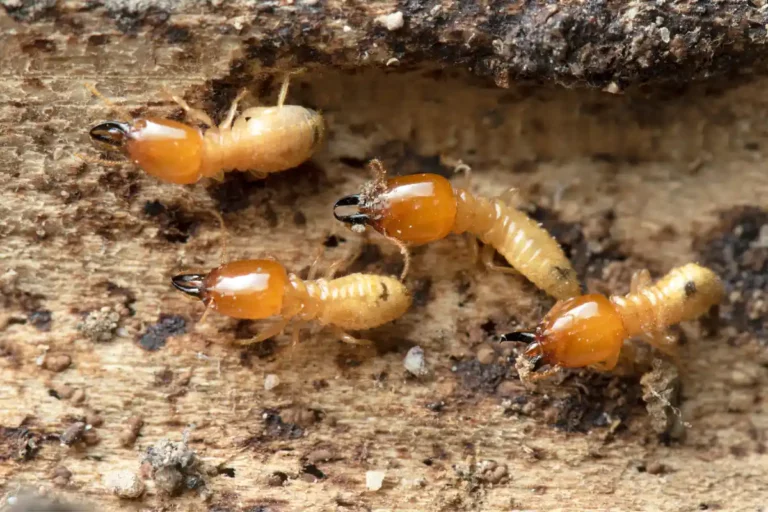Rock or Rubber Mulch? Which is the Best?
Mulch is used in gardening as a soil cover material that inhibits weeds and conserves moisture in the soil. Organic mulch is usually preferred because it breaks down and enriches soil. However, there are times when inorganic mulch like rock and rubber are more suitable.
So, what is the difference between rubber and rock mulch? Which one is better?
Rubber mulch is made from recycled tires, while rock mulch is primarily sourced from river beds. Both are great for preventing weeds, but rubber mulch can be toxic to plants in the long term. Rock mulch is safer and preferred in gardens with plants, while rubber mulch is ideal for areas around playgrounds and athletic fields for its softness.

Rubber mulch vs. Rock Mulch – Differences
Both rock and rubber are inorganic materials. They don’t decompose and won’t add any nutrients to your garden if you use them as mulch. However, they have their use cases as mulch, and it is worth knowing their differences before choosing one.
Here’s a table summary of the main differences between rock and rubber for mulch:
| Rock Mulch | Rubber Mulch |
| Rocks can be sourced from riverbeds and many other places, making them relatively cheaper, costing $60-$170 per ton. | Rubber mulch has to be recycled from used tires, making it more expensive, costing $500-$650 per ton. |
| Rock mulch is more durable than rubber mulch, lasting up to 15 years. | Rubber mulch is less durable than rock mulch, lasting about 10 years on average. |
| Rock mulch is non-toxic to plants. | Rubber mulch is toxic to plants. |
Use cases
Rubber mulch is soft as it is made from ground-up old tires. While it does not have nutritional benefits to soil, it is the best mulch to use around and near playgrounds and landscapes where injuries must be prevented.
On the other hand, rock mulch is sourced from river beds, tumbled rock fragments, or decomposed granite. It is mostly stable and suitable for mulching driveways and garden pathways. However, rock mulch can be unsafe around playgrounds.
Cost of rubber vs rock mulch
Rubber mulch is more expensive than rock mulch because it has to be recycled and processed. The average cost of recycled rubber mulch is about $500-$650 per ton, while river rock mulch costs between $60-$170 per ton.
Rocks can be sourced from a variety of places. It is readily available, making it relatively cheap. Rubber mulch has to be recycled from used tires, making it the more expensive option.
Durability and lifespan
Both rubber and rock mulch are considered relatively permanent solutions for spaces that need inorganic ground cover. Rubber mulch has an average lifespan of 10 years, depending on how fine it is ground.
Rock mulch lasts for an average of 10-15 years. Since it doesn’t decay, river rock garden bedding doesn’t require replacement or top-dressing every season.
Note: While rock and rubber mulches are marketed as permanent mulching solutions, the permanence is relative. Research by Basik et al. on Microbial Degradation of Rubber: Actinobacteria, “Tires contain rubber and other naturally occurring chemicals, which are broken down by microbes over time. Many bacterial species can use rubber as their sole energy source.“[1]
Toxicity
Rock mulch does not have toxic chemicals that could interfere with plant growth while rubber is a little toxic to plants, as it contains VOCs, PAHs, MBTs, and latex. It’s also toxic to humans.
Several studies have found that rubber leachate contains mineral content that can harm plants and aquatic animals. A study by scientists at Bucknell University found that rubber leachate contains zinc, aluminum, cadmium, copper, iron, chromium, molybdenum, manganese, sulfur, and selenium.
The high content of zinc (2%) in rubber has been known to kill landscape plants, which is why rubber may not be a good choice of mulch in gardens.[2] [3]
Benefits of rubber mulch
I recommend using rubber mulch where safety and prevention of injuries are important. Otherwise, rock mulch is a more environmentally friendly option.
Regardless, here are some benefits of using rubber mulch:
- It requires little maintenance: When you install rubber mulch properly, it would not require you to tend to it regularly. However, occasional replenishment may be necessary if the mulching has moved outside the designated surface area.
- Rubber protects plants from pests: Rubber mulch does not attract termites and carpenter ants, unlike other mulches. Therefore, it ensures that your plants and flowers do not get eaten/destroyed by these pests.
- Rubber mulch inhibits weeds: It suppresses the growth of weeds in mulch beds by blocking the much-needed light that weeds need to grow. (See my note below.)
- Rubber mulch is durable: It can withstand harsh weather conditions like strong winds. This is why it can last for ten years.
- Rubber mulch provides good insulation from heat.
- Rubber does not emit a foul smell: Many mulches are known to rot and decompose. As this happens, these mulches produce foul smells. On the contrary, rubber mulch does not rot nor produce foul odors, hence its popularity.
- It stays in place: Since it is heavier than most mulches, it will not get displaced easily. And in case of a heavy downpour, it will not float.
Note: Rubber mulch may not be the best option if your primary goal is to prevent weeds from growing in your garden. Studies have shown that organic mulch options such as sawdust, wood chips, and natural fibers are better at preventing weeds than rubber mulch. (Source)
Advantages of rock mulch
Rock mulch is a type of mulch that consists of decorative gravel or rocks. The primary source of the components of rock mulch is river beds.
Rock mulch comes in different varieties
Several types of rocks are used to make different kinds of rock mulches. Some of these rocks include river rock, granite, and quartz. These rocks come in different shapes, sizes, colors, and textures.
You can develop a unique aesthetic appeal with different designs of rock mulch in your garden.
Rock mulch prevents fungi problems
Fungi thrive in moisture-laden habitats. And since rock mulch doesn’t retain moisture, fungal organisms struggle to survive in this environment.
Rock mulch discourages weeds
Rock mulch is a good product for keeping weeds at bay. For the best results, combine it with landscaping fabric during installation to form a reliable weed barrier.
Remember that stubborn weeds may still penetrate through rock mulch, hence the need for periodic hand weeding.
Rock acts as a warming mechanism for soil
This helps to insulate plants that are sensitive to cold temperatures. However, if you live in a place with sweltering summers, rock mulch may not be the best option, as it retains too much heat.
When to use rock mulch
- When you have poor drainage on your property: Rock mulch would be the best mulch to use here since water will drain much quicker.
- Where you have an area that is an open bed with no plants: Rock mulch would be the best option here since it is low maintenance.
- If you want to improve your garden aesthetics: Rocks provide a beautiful backdrop, especially when you want to install a fountain or statue.
Verdict
Between rock mulch and rubber mulch, which one is better?
The simple answer would be, “it depends.” You may prefer either product over the other, depending on the scenario. You’ll need to consider factors such as the cost, labor requirements, and even the type of plants in your garden.
References
- [1]Basik, A.A., J.-J. Sanglier, C.T. Yeo, and K. Sudesh. 2021. Microbial Degradation of Rubber: Actinobacteria. Polymers 13 (12): 1989.
- [3]Linda Chalker-Scott, Ph.D., Extension Horticulturist and Associate Professor, Puyallup Research and Extension Center, Washington State University. The Myth of Rubberized Landscapes


